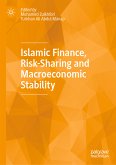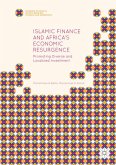This book demonstrates how the global market for Islamic financial services has shown strong growth in recent years and shown remarkable resilience during the global financial crisis.Drawing on a range of international perspectives from the Gulf Cooperation Council countries, Malaysia, Pakistan, Australia and Europe, this book explores the characteristics and performance of Islamic finance and banking and discusses future prospects. It offers a comprehensive theoretical framework for Shariah governance in Islamic financial institutions, explores Shariah-compliant equities, as well as issues in productivity, technology and efficiency. It includes a number of comparative studies on Islamic and conventional banks, Islamic and conventional unit trusts, and Islamic and conventional banks' product mixes. The challenges and opportunities for the expansion of Islamic finance and banking into Europe are explored through the contexts of the UK, Germany and Italy.
Dieser Download kann aus rechtlichen Gründen nur mit Rechnungsadresse in A, B, BG, CY, CZ, D, DK, EW, E, FIN, F, GR, HR, H, IRL, I, LT, L, LR, M, NL, PL, P, R, S, SLO, SK ausgeliefert werden.









